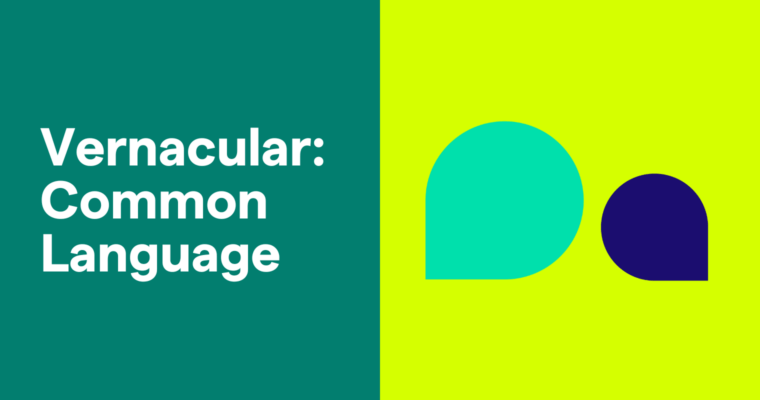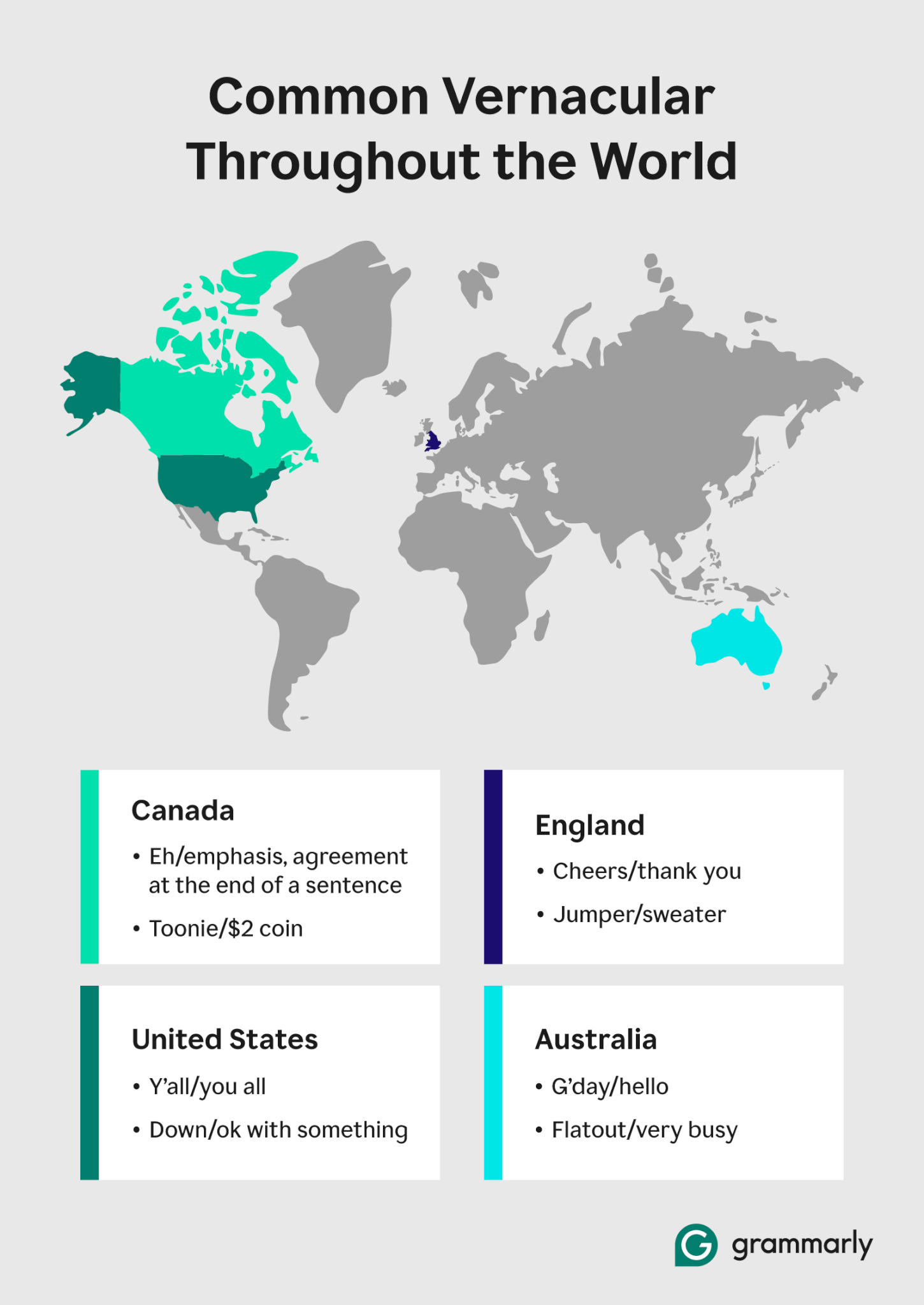
Key takeaways:
- Vernacular is the everyday language used by people in a specific region, group, or social class.
- In writing, vernacular adds authenticity and cultural depth to characters.
- Vernacular is commonly used in narration or dialogue to show how people actually speak.
Vernacular is the natural, informal way people in a specific geographic area or of a particular culture use. This includes specific words people choose, how they pronounce them, their grammar, and unique expressions. Think of vernacular as part of the everyday language of a culture, which uses natural and authentic informal language.
Incorporating vernacular into your writing gives you a powerful tool that enhances other common literary devices, like dialogue and characterization. Vernacular adds authenticity, making your characters and writing feel more real and relatable to readers, who will get a taste of the world you’re describing.
While vernacular adds flavor and relatability to writing, its overuse or inappropriate use can make your work inaccessible and potentially offensive or insensitive. Be cautious when using vernacular language: you want it to add to your storytelling without alienating or offending readers.
Learn more about using and understanding vernacular in both writing and speech below.
Table of contents
When to use vernacular in writing and speech
Vernacular examples

While you might not know all of the different examples within vernacular regions, a few are more well-known. Here are some regional vernacular examples in America:
| Vernacular | Region | Example sentence | Meaning |
| Grinder | New England | While visiting a deli in Connecticut, I ordered a grinder. | Sandwich |
| Y’all | South | Are y’all coming to the meeting this afternoon, or should we reschedule for tomorrow? | All of you or you all |
| Down | West Coast | I’m down for tacos tonight if you are. | Ready or OK with something |
| Ain’t | South | That ain’t how we do things around here. | Am not, are not, or is not |
| Pop | Midwest | I’m going to grab a pop from the fridge—do you want one? | Soft drink |
The significance of African American Vernacular English (AAVE)
African American Vernacular English (AAVE) is a dialect of American English spoken by many Black Americans, especially in urban areas. AAVE has its own grammatical rules, pronunciation, and vocabulary. It has deep historical roots, has evolved over generations, and carries cultural identity through its rhythm and expressions.
You can find AAVE throughout culture, including in music genres like jazz, blues, and hip-hop. It has helped shape America’s music, art, and everyday language. Many popular terms like “flex” and “throw shade” can be traced back to AAVE.
When to use vernacular in writing and speech
Knowing when to use vernacular language can help you enhance a message or connect to your audience, whether you’re writing a story or having a conversation.
Using vernacular in writing
In creative writing, thoughtfully using vernacular can bring characters to life by showing readers their background, culture, and experiences. For example, a character living in New York City might say “Fuggedaboutit!” in dialogue instead of “Forget about it” to emphasize the area’s accent.
This type of detail allows for deeper character development and helps build a more immersive world for the reader. Vernacular also allows writers to explore a character’s identity and belonging.
Using vernacular in speech
Your use of vernacular in speech will depend on the setting. For example, using vernacular makes you sound relatable in casual settings among friends or on social media. However, in formal settings, like a presentation, vernacular can be viewed as inaccessible to a broad audience.
Ultimately, how you use vernacular in writing and speech is about knowing your audience and the purpose behind your words. This context will help you decide whether you can use more casual vernacular or should stick to more formal and inclusive language.
Using vernacular in professional communication
Many people use mild vernacular, including contractions and everyday phrases, in the workplace to create a relaxed and approachable environment. For example, “Let’s touch base tomorrow” and “Just wanted to give you a quick heads-up” are common professional vernacular phrases.
When using vernacular in the workplace, it’s important to balance familiarity with respect. Avoid any regional vernacular that’s too casual or could be offensive to other cultural identities, especially when communicating with clients, executives, and people for whom English is an additional language. You should also avoid using vernacular in formal reports, pitches, presentations, and external communications, especially if they can be misconstrued, damage credibility, or confuse readers.
In short, using vernacular in a professional setting is possible but should be done with caution. Know your audience and avoid anything offensive or confusing.
Other ways to say vernacular
If you’re looking for other ways to say vernacular, several terms capture similar ideas, depending on the context. There are also a few words that mean the opposite. Learn what these words are and how they relate to vernacular below.
Synonyms
The table below lists each vernacular synonym along with its definition and how it relates to vernacular:
| Synonym | Definition | Example | How does it relate to vernacular |
| Colloquialism | A colloquialism is a casual word or phrase used in everyday conversation instead of formal language. | “Wanna” instead of “Want to” | Colloquialisms are often part of a region’s vernacular language. While vernacular refers broadly to the native language or dialect of a group, colloquialisms are the specific, casual expressions within that speech. |
| Dialect | A dialect is a version of a language spoken in a specific region or by a social group, with its own unique words, grammar, and pronunciation. | Southern drawl featuring elongated vowels: “How are you” sounds more like “How ah y’all” | Vernacular often refers to a region’s everyday speech, which is shaped by its dialect. While vernacular emphasizes informal, commonly spoken language, dialect focuses more on the technical linguistic differences between regions or groups. |
| Jargon | Jargon is specialized language used by a specific profession, group, or activity, often unintelligible to outsiders. | “Mise en place” in the culinary world means having all of your ingredients prepped and ready. | Both involve language used by specific groups. However, jargon is usually tied to technical or professional fields, while vernacular refers to everyday, informal speech common to a region or community. |
| Slang | Slang is informal language, often playful or trendy, used by specific groups for casual communication. | “Lit” meaning exciting, excellent, or high energy | Slang is a key part of vernacular speech, especially how people speak informally in everyday life. While vernacular covers a group’s broader dialect or informal language, slang refers to individual words or phrases within that style, and tends to be temporary and evolving. |
Antonyms
Looking for the opposite of vernacular? Learn more about vernacular antonyms below:
| Antonym | Definition | Example | How is it different from vernacular |
| Formal language | Formal language is structured, polite, and often follows strict grammar rules. It’s typically used in professional, academic, or official settings. | “Furthermore,” instead of “also” or “plus” | While vernacular is casual, everyday speech used among peers or within communities, formal language is more reserved and designed for clarity and respect in serious or public communication. |
| Literary language | Literary language is refined, expressive, and often artistic, used in written works like novels, poetry, and essays to create a specific tone or style. | Using imagery to create a picture in the reader’s mind: “Crimson sunsets bled across the bruised purple of the evening sky, the air thick with the scent of honeysuckle.” | Literary language aims for aesthetic or rhetorical effect, whereas vernacular aims for authenticity and natural communication. |
| Standard English | The variety of the English language that is widely accepted and used in formal contexts such as education, government, media, and professional communication. | Using more formal vocabulary: “Hello. How are you?” instead of “What’s up?” | Vernacular is familiar and accessible, while Standard English follows written rules, is used in formal settings, and is associated with a higher social status. |
These antonyms can be helpful when trying to remove vernacular from formal writing, where it’s often less appropriate to use. To identify vernacular, search for more conversational words you’d use in everyday speech or regional phrases that aren’t commonly understood. For example, instead of saying “gonna,” use “going to”; instead of “a lot,” use “many” to maintain a formal tone.
Use vernacular strategically for authenticity in writing
Vernacular brings authenticity to your writing. It helps your characters have an identity tied to a specific culture or geographical region, making them more relatable to readers. However, writers should use vernacular sparingly to avoid turning their work into parody and offending the people they’re writing about.
Ensure sentences are clear with Grammarly
Vernacular language adds authenticity but can challenge clarity and grammar. Grammarly helps balance this, suggesting changes that maintain your tone while flagging spelling, grammar, or punctuation issues. No matter the style, Grammarly ensures your message remains clear and intentional.
Vernacular FAQs
Learn more about vernacular and related topics by exploring answers to the following FAQs:
When does slang become vernacular?
Slang becomes vernacular when it transitions from a temporary, niche expression to a widely accepted and regularly used part of a specific group’s everyday speech. Over time, certain slang terms gain widespread usage and become a part of the vernacular as language evolves.
As more people use the word(s) in daily conversations, it becomes familiar, moving from slang to standard language. This process can take years or even decades, and it’s all dependent on cultural trends and influence. For example, words like cool and rad began as slang and evolved to become part of the vernacular due to their consistent use over time.
Is vernacular the same as language or vocabulary?
No, vernacular is not the same as language or vocabulary, but they are related:
- Language is the entire system of communication used by a community. It includes grammar, syntax, and vocabulary.
- Vocabulary is the words used within a particular language or by a specific group.
- Vernacular is a specific type of language referring to everyday informal vocabulary used by a specific group, region, or culture.
How do I know if I’m using too much vernacular?
Your use of vernacular should depend on the context and your audience. If you’re speaking to friends casually, using more vernacular is natural. Meanwhile, in formal settings, like a work email, you should use mild vernacular sparingly to remain professional and inclusive.
It can be easy to overdo vernacular in creative writing when trying to make your characters relatable and natural-sounding. Aim for a balance of vernacular that won’t alienate or confuse your readers.






